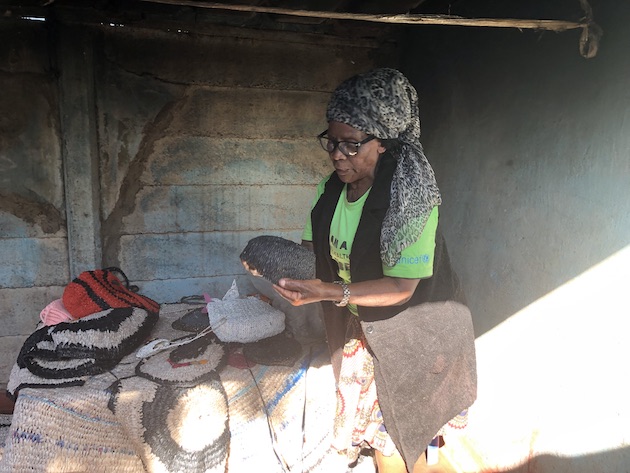HARARE, Oct 20 (IPS) – They do not have a pension nor financial support from families or relatives, but they have themselves. Now they have become collectors of plastic waste, which they turn into products as they battle for survival – earning money from the growing plastic pollution in Zimbabwe.
Such are the lives of the country’s senior citizens, like 76-year-old Tabeth Gowere and 81-year-old Elizabeth Makufa, both hailing from Harare’s Glenora high-density suburb, where they become famous as plastic waste collectors.
Gowere and Makufa, thanks to plastic waste, now care for themselves financially despite their old age, so they said.
“At first, we saw plastic waste just being flown around by the wind, and we started to pick these, cleaning the environment, burning it, but later realized we could make something out of these plastics and earn money. So, using plastic waste, we started weaving different things, including mats to decorate sofas. Many people were impressed by our work, and they started placing orders for the plastic products we were making,” Gowere told IPS.
Makufa, like Gowere, has also seen gold in the dumped plastic waste.
“We say this is waste, but from it, we find something that is helping us to sustain us in life. I make 30 US dollars daily at times from selling the products I make from plastic waste, which means at least I get something to survive,” Makufa told IPS.
The young are learning from the lessons from the senior plastic waste entrepreneurs – like 40-year-old Michelle Gowere.
“Weaving things using plastics is a skill I learned from my mother-in-law, Mrs Gowere. We spend time together daily, and because of this, I ended up learning the skill from her; this is helping me to, at least, help my children with food to carry in their lunch boxes when they go to school,” Michelle told IPS.
To Michelle’s mother-in-law and many others, the environment has been the secondary beneficiary of the geriatrics’ initiative collecting plastic waste.
“You would see that in our area, waste collectors from the council rarely come to empty the refuse bins. So, as we use plastic waste to make our products, we are making our environment clean,” Michelle told IPS.
Zimbabwe Environmental Management Agency (EMA) about 1.65 million tonnes of waste are produced annually in Zimbabwe, with plastic making up 18 percent of that.
However, Makufa says it was not the love of money that swayed them into getting into plastic waste but improving the environment.
“It was not because we lacked money that we turned to collecting plastic waste, but we copied some people who were doing it, and we started doing the same. We thought of removing plastic waste from our environment, and we told ourselves if we could take those plastics and weave them together, we could have impressive products that we could sell and earn some money,” Makufa told IPS.
As the group of elderly people are making a difference in collectively fighting plastic waste, the local authorities welcome their contribution but add that it is everybody’s responsibility to care for the environment.
“The job of caring for the environment is not a responsibility of the council alone. In fact, it is the duty of everyone to make sure where they live there is cleanliness. As a council, we thank people who are beginning to realize that there is money in plastic waste. It’s not every waste that should be dumped; there is what we call recycling, and some people make money from it, but the duty to take care of our surroundings is not a prerogative of the council, but ordinary people as well,” Innocent Ruwende, Harare City Council spokesperson, told IPS.
Priscilla Gavi, director of Help Age Zimbabwe, a non-governmental organization mandated to take care of the elderly’s needs, says the elderly, too, are critical in the fight against plastic waste.
“Old age does not make someone incapable of supporting their families and taking care of themselves. It doesn’t stop the aged from working for their country. In fact, old age gives people opportunities to use skills gained during their prime ages, and they, for instance, make use of plastics, producing different things for sale from plastic waste as they also rid the environment of the plastic waste,” Gavi told IPS.
Yet for many like Makufa, collecting plastic waste has also turned out to be therapeutic in addition to being an economic venture.
“These things that we make with our own hands using plastic waste help us to rest from mental stress owing to problems we have these days that strain us psychologically. So, this helps us to be always occupied and refrain from overthinking about things we don’t have control over,” said Makufa.
According to the Environmental Management Agency (EMA), an estimated 1.65 million tonnes of waste are produced annually in Zimbabwe, with plastic making up to 18 percent of that.
Gowere and Makufa and other elderly recyclers and plastic entrepreneurs have drawn the admiration of organizations like EMA.
“This is a commendable initiative that is promoting upcycling of waste and upscaling recycling as a business. This reduces the amount of waste that ends up in landfills and the environment. Plastic waste takes hundreds of years to decompose, and it releases harmful toxins into the environment when burned,” Amkela Sidange, spokesperson for EMA, told IPS.
IPS UN Bureau Report
Follow @IPSNewsUNBureau
Follow IPS News UN Bureau on Instagram
© Inter Press Service (2023) — All Rights ReservedOriginal source: Inter Press Service
Check out our Latest News and Follow us at Facebook
Original Source

